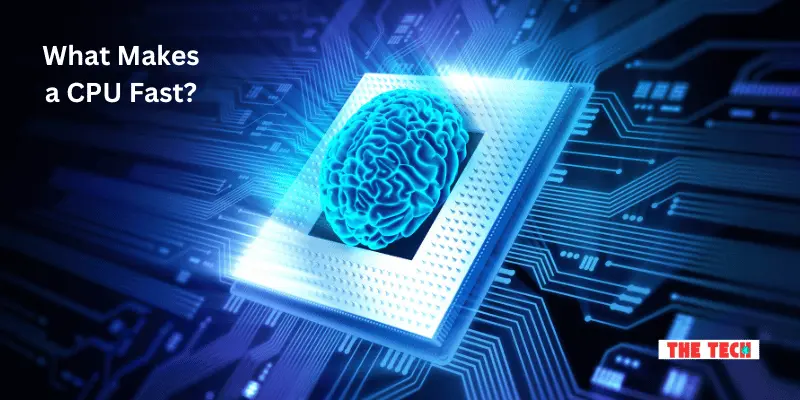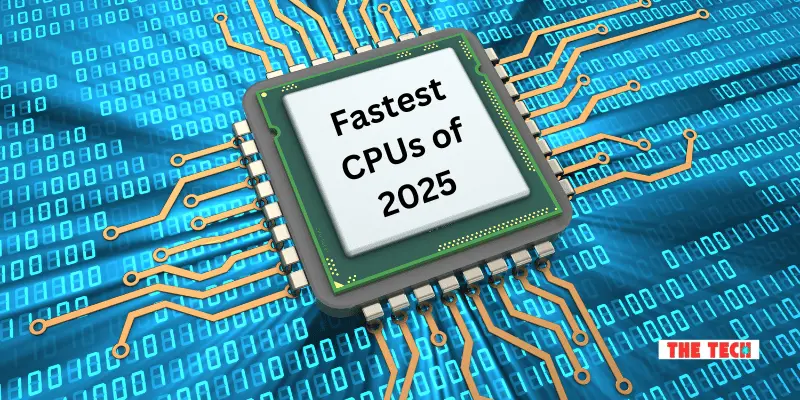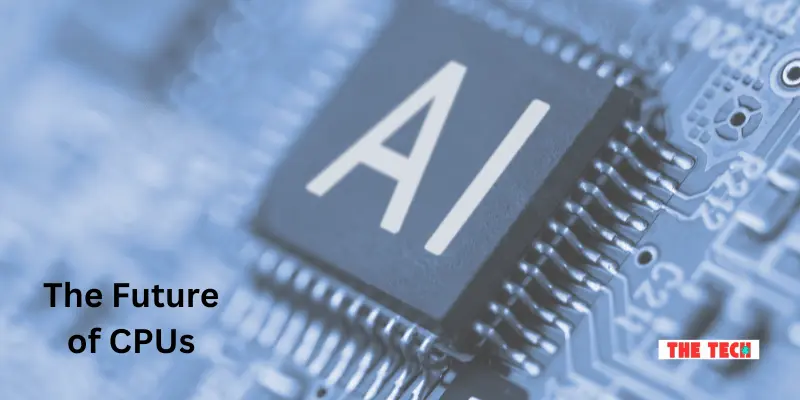The Fastest CPU of 2025
Published: February 20, 2025
Hello PC lovers, today I am sharing about The Fastest CPU of 2025. CPUs (Central Processing Units) are the heart and brain of every computer.
Whether you’re gaming, editing videos, running (Artificial Intelligence)AI programs, or managing large data centers, the speed and power of your CPU make all the difference.
A faster CPU means quicker processing, smoother multitasking, and better overall performance.
The tech industry is always evolving, and every year, companies like AMD, Intel, and Apple push the boundaries of what CPUs can do.
The competition is fierce, from higher clock speeds and more cores to AI-powered processing and energy efficiency.
In 2025, we’ve seen some of the biggest leaps in CPU technology yet.
The latest processors are faster, more efficient, and smarter than ever before, catering to gamers, professionals, and enterprise users alike.
In this article, we’ll explore the fastest CPUs of 2025 and how they’re shaping the future of computing.
What Makes a CPU Fast?

Not all CPUs are the same. Some are super fast, while others are better for basic tasks.
But what actually makes a CPU fast and powerful?
Let’s break it down in simple terms.
Core Count & Threads – More Means Faster Multitasking
A CPU has cores, which are like mini-brains inside it. More cores mean the CPU can handle multiple tasks at once. For example:
- A quad-core (4 cores) CPU can do a few tasks at the same time.
- A 16-core CPU can do many things at once, making it great for gaming, video editing, and AI work.
- Threads help each core do even more at the same time, improving multitasking.
Clock Speed & Boost Frequency – Why GHz Matters
Clock speed, measured in GHz (gigahertz), tells you how fast a CPU can process data. A higher GHz means:
- Faster performance in everyday tasks.
- Better gaming experience with higher FPS.
- Quick loading times for software and apps.
Some CPUs also have Boost Frequency, which lets them temporarily run even faster when needed, like when playing a high-end game or rendering a 4K video.
Architecture & Manufacturing Process – Smaller is Better
The architecture of a CPU is like its blueprint. Newer architectures make CPUs faster, smaller, and more power-efficient.
- AMD Zen 5 – Brings higher speed and better power efficiency for gaming and workstations.
- Intel 4 – Intel’s latest energy-efficient chip with better AI support.
- Apple’s 3nm Chips – Smaller size means lower power use and faster speeds in Mac devices.
Cache & Memory Bandwidth – Why More is Better
The cache is like the CPU’s short-term memory.
A bigger cache helps the CPU store important data closer to the processor, which speeds things up.
Memory bandwidth also matters because it controls how fast data moves between the CPU and RAM.
- More cache = Faster response times.
- Higher memory bandwidth = Better performance in gaming, AI, and big applications.
AI & Machine Learning – The Future of CPUs
Modern CPUs come with AI processing to handle smart applications, voice assistants, and real-time decision-making.
AI-powered CPUs are now:
- Helping creatives with fast photo & video editing.
- Improving gaming with smarter in-game AI.
- Speeding up data processing in AI and machine learning tasks.
A fast CPU is not just about GHz or core count—it’s a combination of many factors.
Whether you’re a gamer, a professional, or a casual user, choosing the right CPU depends on your needs.
The CPUs of 2025 are faster, smarter, and more efficient than ever before, giving us a glimpse of an exciting future in computing!
Top 6 Fastest CPUs of 2025

In 2025, the CPU industry has made significant advancements, bringing faster and more efficient processors.
Whether you are a gamer, a professional content creator, or someone working with artificial intelligence and data processing, choosing the right CPU can make a huge difference.
Here is a detailed look at the top six fastest CPUs of 2025, covering their specifications, performance, and ideal use cases.
AMD EPYC 9965 ‘Turin’ – The Ultimate Server Powerhouse
The AMD EPYC 9965 ‘Turin’ is the most powerful CPU released in 2025, designed specifically for high-performance computing, data centers, and artificial intelligence workloads.
Key Features
- 128 cores and 256 threads for extreme multitasking and workload management.
- Built on AMD’s Zen 5 architecture, offering significant performance gains over previous generations.
- Higher memory bandwidth, making data processing much faster and more efficient.
- Improved power efficiency, reducing overall energy consumption in large-scale operations.
Use Cases
- Ideal for cloud computing, where multiple virtual machines run simultaneously.
- Best suited for artificial intelligence training and machine learning models, requiring extensive parallel processing power.
- Highly beneficial for large enterprises handling vast amounts of data and computational tasks.
The AMD EPYC 9965 ‘Turin’ sets a new benchmark in server processing power, making it the best choice for professionals working in AI, cloud services, and enterprise computing.
AMD Ryzen 9 9950X3D – Best for Gaming and Creative Work
The AMD Ryzen 9 9950X3D is a top-tier consumer processor designed for gamers, video editors, and professionals working with creative software.
Key Features
- 16 cores and 32 threads, delivering strong multitasking and high-speed processing.
- 3D V-Cache technology, improving game load times and overall gaming performance.
- Boosts gaming speeds by up to 8 percent compared to previous models, offering a smoother experience.
- Optimized for creative software, including video editing, animation, and 3D rendering.
Use Cases
- Best suited for PC gamers looking for high frame rates and low latency.
- Great for video editing and content creation, ensuring faster rendering times.
- Suitable for professionals working with graphic design and animation software.
With its powerful architecture and innovative caching technology, the Ryzen 9 9950X3D is one of the best choices for both gamers and creative professionals in 2025
Intel Core Ultra 9 275HX – The Fastest Laptop CPU
The Intel Core Ultra 9 275HX is the most powerful laptop processor in 2025, bringing desktop-level performance to portable machines.
Key Features
- 24 cores, including 8 performance cores and 16 efficiency cores, balancing speed and power consumption.
- Up to 5.8GHz boost clock speed, ensuring fast execution of demanding applications.
- Outperforms AMD Ryzen 9 7945HX3D in laptop benchmarks, making it the fastest option for portable computing.
- Improved battery efficiency, allowing longer use without sacrificing power.
Use Cases
- Ideal for high-performance gaming laptops, providing seamless gameplay.
- Best for mobile workstations, used by engineers, designers, and professionals requiring powerful processing.
- Suitable for video editing, 3D modeling, and rendering on the go.
With its high clock speeds and efficient power management, the Intel Core Ultra 9 275HX is the best choice for those needing desktop-level power in a portable form.
Apple M4 Max – The Most Efficient High-End Processor
The Apple M4 Max continues Apple’s trend of creating efficient yet powerful processors for professionals and content creators.
Key Features
- 16 CPU cores and 40 GPU cores, ensuring smooth multitasking and superior graphics performance.
- Built on a 3nm process, making it one of the most power-efficient high-end chips.
- Supports up to 128GB of unified memory, providing seamless performance for demanding tasks.
- Optimized for macOS, integrating software and hardware for maximum efficiency.
Use Cases
- Best suited for video editors working with 4K and 8K footage, ensuring faster rendering and smoother playback.
- Ideal for 3D rendering and animation, benefiting from Apple’s optimized GPU performance.
- Perfect for Mac users requiring a powerful yet energy-efficient CPU.
With its combination of efficiency and power, the Apple M4 Max is a top choice for creative professionals using Apple’s ecosystem.
Intel Core i9-14900K – The Overclocking King
The Intel Core i9-14900K is a high-performance desktop processor designed for gaming enthusiasts and PC builders who want the best overclocking potential.
Key Features
- 8 performance cores and 16 efficiency cores, optimizing multitasking and single-core speeds.
- Up to 6.0GHz turbo boost clock, making it one of the fastest CPUs for gaming.
- Unlocked for overclocking, allowing users to push the CPU beyond factory settings.
- Strong single-core performance, improving gaming and high-speed applications.
Use Cases
- Best for gamers building high-performance desktops, providing high frame rates and low latency.
- Suitable for PC enthusiasts who enjoy overclocking, giving full control over system performance.
- Great for content creators, ensuring smooth rendering and fast video processing.
With its high clock speeds and ability to overclock, the Intel Core i9-14900K is one of the best CPUs for gaming and custom PC builds.
AMD Ryzen AI Max Plus 395 – The Future of AI Computing
The AMD Ryzen AI Max Plus 395 is designed for the next generation of computing, focusing on artificial intelligence and machine learning applications.
Key Features
- 16 cores and 40 RDNA 3.5 compute units, providing advanced AI processing power.
- Outperforms Intel’s Lunar Lake processors in AI-driven tasks, making it a leader in AI computing.
- Built for AI applications, improving automation, data analysis, and graphics rendering.
- Optimized for software that relies on machine learning, offering better speed and efficiency.
Use Cases
- Best suited for AI research and development, helping build and train deep learning models.
- Ideal for content creators using AI-powered design and editing tools.
- Great for advanced data processing, benefiting companies that rely on AI-driven insights.
With its focus on artificial intelligence and machine learning, the AMD Ryzen AI Max Plus 395 is shaping the future of computing in 2025.
The CPUs of 2025 have pushed the limits of speed, efficiency, and innovation.
Whether you are a gamer, a professional creator, or working in AI and data science, there is a CPU that fits your needs.
AMD, Intel, and Apple continue to compete at the highest level, offering powerful options for both desktops and laptops.
Choosing the right processor depends on your specific workload and computing requirements.
The AMD EPYC 9965 ‘Turin‘ dominates the server space, while the Intel Core Ultra 9 275HX leads in laptop performance.
For gaming and creative work, AMD and Intel offer powerful consumer CPUs, while Apple continues to refine efficiency and performance in the Mac ecosystem.
As technology advances, the next generation of CPUs will only get faster and more efficient, shaping the future of computing in exciting new ways.
Cache & Memory Bandwidth – Why More is Better
When it comes to CPU performance, two key factors play a huge role: cache and memory bandwidth.
These directly impact how fast a processor can handle tasks, from gaming to artificial intelligence and data processing.
Let’s break down why having more cache and higher memory bandwidth makes a big difference.
What is Cache?
Cache is like a CPU’s short-term memory.
Instead of fetching data from slower main memory (RAM) every time, the CPU stores frequently used information in the cache.
This makes processing much faster and more efficient.
Why Does More Cache Help?
- Faster access to data: The CPU doesn’t have to wait for RAM to send information.
- Better multitasking: More cache allows the CPU to handle multiple tasks smoothly.
- Improved gaming and AI performance: Games and AI programs rely on quick data access, and cache speeds this up.
Example: Imagine working on a project and keeping important notes on your desk instead of searching for them in a filing cabinet. The desk is the cache—it saves time by keeping key information within reach.
What is Memory Bandwidth?
Memory bandwidth refers to how fast data moves between the CPU and RAM. The higher the bandwidth, the quicker the CPU can get the information it needs to run applications smoothly.
Why Does Higher Memory Bandwidth Matter?
- Boosts gaming performance: Games load textures and process data faster.
- Enhances AI and big applications: AI models require fast memory access to process large datasets.
- Reduces lag in high-performance tasks: Video editing, 3D rendering, and simulations run more efficiently.
Example: Think of memory bandwidth like a highway. A wider highway (higher bandwidth) allows more cars (data) to travel quickly, avoiding traffic jams (slowdowns).
Both cache size and memory bandwidth are crucial for faster, smoother computing.
A larger cache helps the CPU process data quickly, while higher memory bandwidth ensures data moves faster between RAM and the processor.
For gamers, AI researchers, and content creators, investing in a CPU with more cache and higher memory bandwidth can dramatically improve performance, making everything feel faster and more responsive.
AI & Machine Learning – The Future of CPUs

Modern CPUs are not just about raw speed anymore. They are becoming smarter by integrating Artificial Intelligence (AI) and Machine Learning (ML).
This means that today’s processors can automate tasks, improve efficiency, and handle AI-powered applications much faster than ever before.
From photo editing to gaming and data analysis, AI-enhanced CPUs are revolutionizing computing.
How AI is Changing CPUs
AI-powered CPUs come with specialized AI processing units, sometimes called Neural Processing Units (NPUs) or AI accelerators.
These help the CPU understand patterns, make real-time decisions, and optimize tasks without slowing down other processes.
What AI in CPUs Can Do
Faster and Smarter Photo & Video Editing
AI makes editing tasks much easier and quicker by automating complex processes. Some key benefits include:
- Instant background removal – AI can automatically cut out subjects from images without manual effort.
- Auto-enhancements – AI can adjust brightness, contrast, and sharpness in photos and videos instantly.
- AI-based upscaling – Older or low-resolution images and videos can be enhanced to look sharper and clearer.
- Speech-to-text transcription – AI helps video editors automatically generate subtitles and transcriptions.
For photographers, video editors, and content creators, AI-powered CPUs save hours of manual work and make editing more efficient.
Smarter In-Game AI for Better Gaming
AI in gaming is not just about better graphics; it also makes the gaming experience more realistic and immersive.
- Enhanced NPC behavior – AI improves how non-playable characters (NPCs) react in games, making them behave more naturally.
- AI-assisted game optimization – AI helps adjust game settings in real-time to ensure smooth performance.
- Real-time ray tracing – AI enhances lighting, reflections, and shadows to make games look more lifelike.
- AI-based voice interaction – Some games now include AI-powered voice assistants that respond to player commands.
With AI-powered CPUs, gaming is not just faster but also smarter, smoother, and more visually stunning.
Faster AI and Machine Learning Processing
AI and ML require massive amounts of data processing, and AI-optimized CPUs significantly speed up these tasks.
- Faster AI model training – AI CPUs help data scientists train machine learning models more efficiently.
- Improved voice assistants – AI-powered CPUs enhance the speed and accuracy of Siri, Alexa, and Google Assistant.
- AI-driven cybersecurity – CPUs with built-in AI can detect and prevent cyber threats in real-time.
- Smarter automation – AI-powered processors help businesses automate tasks like data analysis, customer support, and inventory tracking.
For industries like finance, healthcare, and research, AI-powered CPUs mean faster results, smarter insights, and improved security.
More Cores vs. Higher Clock Speed – What’s Better?
- More cores help in tasks like video editing, AI processing, and multitasking.
- Higher clock speed (GHz) is better for gaming and single-core applications.
- Laptop CPUs Are Getting Closer to Desktop Power
The Intel Core Ultra 9 275HX offers desktop-like performance in laptops, making it great for gamers and professionals on the go.
Why AI-Powered CPUs Matter
As AI becomes an essential part of modern computing, CPUs with built-in AI acceleration provide better performance, efficiency, and automation.
Whether you’re a gamer, content creator, AI developer, or business professional, a processor with AI features can save time, improve productivity, and enhance overall user experience.
With continued advancements, AI-powered CPUs will shape the future of technology, making computing smarter, more intuitive, and more powerful than ever before.
FAQs
An AI-powered CPU is a processor designed with built-in AI acceleration to handle machine learning tasks more efficiently. These CPUs include Neural Processing Units (NPUs) or AI cores that help process AI-based applications faster than traditional processors. They improve performance in photo editing, gaming, data analysis, and automation. AI-powered CPUs are becoming essential for modern computing as AI applications grow in importance.
AI enhances gaming by optimizing graphics, improving NPC behavior, and reducing lag. AI-powered CPUs can dynamically adjust game settings for smoother gameplay and better frame rates. They also support real-time ray tracing, making lighting and shadows more realistic. AI helps game AI characters learn and adapt, making the gameplay more immersive and challenging.
No, AI-powered CPUs benefit both professionals and everyday users. While professionals in fields like video editing, AI research, and cybersecurity see major benefits, regular users also experience faster multitasking, improved voice assistants, and better security. AI features also improve web browsing, music recommendations, and automatic translations. These CPUs make computing smarter and more efficient for everyone.
Yes, AI-powered CPUs greatly improve video editing performance. They help with automatic color correction, background removal, and AI-based upscaling for sharper video quality. AI also speeds up rendering times and allows real-time effects without lag. These features make video editing faster and more accessible for both professionals and beginners.
Not necessarily. While AI processing requires additional resources, modern CPUs are designed to be more power-efficient. AI helps manage power distribution within the CPU, ensuring optimized energy usage. Many AI-powered processors use advanced manufacturing processes like 3nm and 5nm, which improve efficiency. This results in higher performance without excessive power consumption.
Yes, AI-powered CPUs enhance cybersecurity by detecting threats in real-time. They use AI-based anomaly detection to identify suspicious activities and block potential cyberattacks. AI also improves password protection, malware detection, and network security. Many businesses and individuals rely on AI-powered CPUs to protect sensitive data from hackers.
A regular CPU processes tasks in a general way, while an AI-powered CPU includes specialized AI acceleration for handling AI-based applications more efficiently. AI-powered CPUs have dedicated AI cores or NPUs, making them faster for tasks like deep learning, real-time analytics, and smart automation. They also optimize gaming, content creation, and voice recognition better than traditional CPUs.
Not entirely. While AI-powered CPUs improve AI performance, GPUs (Graphics Processing Units) are still better for deep learning and high-end AI training. However, AI CPUs are closing the gap by handling smaller AI workloads efficiently. In the future, a combination of AI CPUs and GPUs will provide the best performance for AI applications.
AI-powered CPUs can be slightly more expensive than traditional ones, but the extra cost is justified by better performance and efficiency. Over time, as AI technology becomes mainstream, prices will become more affordable. Many mid-range and high-end CPUs now come with built-in AI features, making them accessible to a wider audience.
Yes, AI-powered CPUs are continuously improving. Future CPUs will have better AI acceleration, more efficient cores, and enhanced power management. They will also support advanced AI applications like real-time speech translation, smart automation, and enhanced cybersecurity. As AI technology grows, AI-powered CPUs will become even more powerful and intelligent.
Conclusion
The CPU industry is evolving faster than ever, with 2025 bringing some of the most powerful and efficient processors we’ve seen.
From the AMD EPYC 9965 ‘Turin’, designed for data centers and AI, to the Intel Core Ultra 9 275HX, built for high-performance laptops, there is a CPU for every need.
AI-powered CPUs are also changing the game, making computing smarter, faster, and more efficient.
Whether you’re a gamer, content creator, or professional, choosing the right CPU can boost performance and productivity.
As technology continues to improve, we can expect even more advanced CPUs in the future, making computers faster, more intelligent, and more energy-efficient.
Bonus Info Points
- Upgrading Your CPU Can Boost Performance: If your computer is slowing down, upgrading to a newer, faster CPU can make a huge difference in gaming, video editing, and multitasking.
- Cooling is Important for High-Performance CPUs: Powerful CPUs like Intel Core i9-14900K generate a lot of heat. Using a good cooling system (air or liquid cooling) helps maintain performance and lifespan.
- Apple’s M-Series Chips Are Changing the Industry: With their unified memory architecture and power efficiency, Apple’s M4 Max chips are making MacBooks faster and better for creative work.
- AI is the Future of CPUs: AI-powered CPUs, like AMD Ryzen AI Max Plus 395, can speed up creative tasks, improve voice recognition, and make gaming AI smarter.
- Faster Memory and Storage Help CPU Performance: Pairing a high-speed SSD and fast RAM with your CPU can improve your PC’s speed and responsiveness.
- Energy Efficiency is Becoming a Priority: New CPUs use advanced manufacturing processes (like 3nm and Intel 4) to reduce power consumption and heat, making computers more energy-efficient.
- Overclocking Can Improve Performance – But With Risks: Pushing a CPU beyond its default speed can increase performance, but it requires good cooling and can reduce lifespan.
Future CPUs Will Get Even Faster and Smarter: Expect better AI integration, improved efficiency, and higher speeds as CPUs evolve, making computers more powerful and intelligent.

- Be Respectful
- Stay Relevant
- Stay Positive
- True Feedback
- Encourage Discussion
- Avoid Spamming
- No Fake News
- Don't Copy-Paste
- No Personal Attacks



- Be Respectful
- Stay Relevant
- Stay Positive
- True Feedback
- Encourage Discussion
- Avoid Spamming
- No Fake News
- Don't Copy-Paste
- No Personal Attacks





